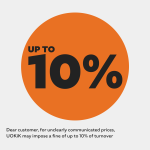
- Planting trees … that are already growing, parcel collection machines … that reduce carbon dioxide, CO₂ emission calculators … that omit important data – is this just greenwashing? The President of UOKiK raises the first allegations of greenwashing.
- Consumers, encouraged by eco-friendly slogans, could choose products or specific delivery methods, believing that they were supporting the environment.
- If the allegations are confirmed, the companies face penalties of up to 10% of their turnover for each practice.
The President of UOKiK has accused four companies – Allegro Polska, DHL eCommerce Poland, DPD Polska, and InPost – of greenwashing, i.e., pseudo-ecological marketing that misleads consumers about the actual environmental impact of their services. Statements such as “green fleet”, “zero-emission”, and “environmentally neutral” were based on incomplete data or only referred to a fraction of their operations. In turn, statements such as “we plant trees” were based on conditions that were not clearly and comprehensively communicated to consumers. The long-term consequence of dishonest practices by companies engaging in greenwashing may be to discourage consumers from choosing products and services that actually have a neutral or positive impact on the environment. This also discourages reliable and responsible entrepreneurs who implement environmentally friendly and often costly solutions for the benefit of the environment from taking pro-environmental measures. If the allegations of the President of UOKiK are confirmed, the four companies may face financial penalties of up to 10% of their turnover for each contested practice.
– Green slogans cannot be empty promises. If a company declares that it operates in an environmentally friendly manner, it must confirm this with facts, not creative CO₂ calculations, clever slogans that paint every message green, or actions that only appear to support the environment. Consumers have the right to know what really lies behind their choices and expect honesty, not greenwashing – explains Tomasz Chróstny, President of UOKiK.
A tree from Allegro for those in the know
Promoted since 2023, the campaign “We plant trees for Allegro One deliveries” promised that for every 10 deliveries, a tree would be planted “on behalf” of the customer. Internet users tracked their progress on a counter, believing that their choice of delivery method would have a real impact and a positive effect on the environment. However, the reality was different. Starting in 2024, Allegro introduced a new, poorly communicated condition: in order for the company to plant a tree “on behalf” of a user, an online dedication had to be entered within 30 days. Information about the change in the terms and conditions of the promotion was provided only once in a December e-mail - one of many holiday marketing messages. Most users were unaware of this obligation, as the company not only failed to remind them about it, but also did not include a notice in the app or when parcels were collected. Furthermore, the option to add a dedication was blocked for Allegro customers for significant periods of time. Finally, trees were planted “in advance” regardless of consumer behaviour in a given year. The company had previously symbolically assigned the trees planted earlier to customers who met the conditions of the campaign. This means that consumers’ decisions to choose Allegro’s delivery method “for the good of the planet” had no direct impact on actual planting. The President of UOKiK has brought two charges against the company for misleading consumers.
– We have brought charges against three courier companies concerning so-called “green deliveries”. The environmental friendliness of shipments cannot be demonstrated solely by information about the expansion of a low-emission fleet that is gradually replacing combustion engine vehicles. Statements about the environmental benefits of electric vehicles must be clear and accurate and cover the entire life cycle of these vehicles. It is worth noting that in Poland, there is no real possibility of powering an electric vehicle fleet in a zero-emission manner if the vehicles are charged at publicly accessible stations. Even if the shipment is delivered to the customer by an electric vehicle, the vehicle itself is charged with electricity that comes from over 60% coal. When constructing statements about the environmental friendliness of transport, it is important not to mislead the public – explains Tomasz Chróstny, President of UOKiK.
“Eco-friendly” parcel deliveries and collections according to DHL
“DHL is ECO, so POP BOX has to be too! So, eco-friendly parcel collection from DHL is now available”. Simple? According to the company, consumers who wanted to act in an environmentally friendly manner had an alternative: instead of home delivery, they could have their parcels delivered to a collection point. Environmentally friendly? If… all consumers collect or send parcels “on the way” – e.g. on their way home from work by bike or on foot. If… they live in a city where there are many collection points and it only takes 10 minutes to walk to a DHL POP. If… the delivery is “ECO”, because even though the company describes itself as a pioneer in green logistics, emphasising the use of bicycles and electric vehicles, it still mostly uses combustion engine cars. The information gathered by the Office indicates that, in reality, the company’s fleet consists largely of high-emission vehicles and there is no evidence that consumers walk on foot to collect their parcels. Basing a campaign on false messages or unreliable or unverifiable data may mislead consumers.
The President of UOKiK is also looking into other pseudo-ecological activities of the company, such as planting trees and cleaning the river. The collected materials indicate that actions of this type were local or incidental in nature. The slogan “PaczULE to the rescue of bees”, which appeared on the company’s website, also raises doubts. The campaign consisted of placing five beehives on the roof of the company’s headquarters in Warsaw. All of DHL’s pro-environmental messages were accompanied by evocative motifs and graphics directly related to nature and the environment. The President of UOKiK has brought four charges against the company for misleading consumers.
DPD and pseudo-green declarations
The second company that positioned itself as a leader in eco-friendly logistics solutions was DPD. This was evidenced by slogans such as “green car fleet”, “DPD delivers environmentally neutral parcels” and “ZERO emissions.” Such messages are misleading if they do not take into account the scale of the business or the entire journey a parcel takes to reach the consumer. Statements about the environmental benefits of electric vehicles must be clear and accurate and take into account their entire life cycle. The President of UOKiK has brought six charges against the company for misleading consumers.
InPost and alleged zero-emission e-commerce
“We deliver zero-emission e-commerce” – this is the slogan InPost uses to convince its customers to choose parcel lockers® instead of home delivery. The company promotes its services as environmentally friendly. Meanwhile, as determined by UOKiK, the majority of the fleet consists of high-emission vehicles, with electric vehicles accounting for only a small percentage.
In addition, the company uses simplifications and associations in its marketing communications to emphasise the ecological nature of parcel machines and the positive impact of choosing delivery via these machines on reducing CO₂ emissions. For example, one parcel machine displayed the following slogan: “One parcel machine per day reduces as much CO₂ as nine trees in a year”. It sounds impressive: the slogan is simple, emotional and captures the imagination. The problem is that this has not been properly proven. The parcel machine does not perform photosynthesis and does not absorb carbon dioxide. Its potential environmental benefit can only result from a reduction in the number of courier trips, and only if recipients actually collect their parcels on foot or by bicycle and send them in the same way, and parcels are delivered to parcel machines by a low-emission fleet. The Office’s findings to date indicate that InPost did not have reliable data on how parcels were collected and sent via its parcel lockers®. Another accusation concerns the calculation of the carbon footprint. The company has added a carbon footprint calculator to the app that customers use to track their packages. Its calculations are based on selective data, for example, ignoring how it is perceived by consumers. Furthermore, the messages on the company’s website, through suggestive comparisons, put pressure on consumers to choose the delivery method preferred by InPost. This can be considered an example of ecoshaming, i.e. putting pressure on consumers to feel guilty if they do not choose the option promoted as the most environmentally friendly – even when its actual impact on the environment is negligible or unproven. The company’s misleading information regarding the implemented calculator and data presentation was reflected in the opinions of dissatisfied consumers, which were collected during the preliminary investigation. The President of UOKiK has brought three charges against the company for misleading consumers.
These are not the only measures taken by the President of UOKiK in the area of greenwashing. The Office is conducting nine parallel preliminary investigations into companies in the clothing, retail, e-commerce, and transport services industries. If the contested practices are not changed, further charges may be brought.
How not to fall for greenwashing?
- Beware of greenwashing – honest environmental claims such as “eco”, “natural” and “environmentally friendly” should be backed up by hard data. Pay attention to whether the entrepreneur provides: names of materials, percentage of ingredients, source of origin. Their absence may indicate greenwashing.
- Don’t be guided solely by the graphic design. Green colour, leaf graphics or planet icons are often merely aesthetic elements that suggestively influence perception – they are not proof of a product’s environmental friendliness.
- Be careful when you see comparisons – slogans such as “more eco-friendly than others” are meaningless unless they clearly indicate what the comparison refers to.
- Turn on the warning light – if the company is concealing facts. If the statements promote only positive data and omit important issues, such as emissions from other areas of activity, you may be dealing with greenwashing.
Information for the media
| +48 603 124 154 | |
| biuroprasowe@uokik.gov.pl | |
 | pl. Powstańców Warszawy 1 00-950 Warszawa |
Follow us
Help for consumers
| 801 440 220 | +48 222 66 76 76 operator fee | |
| poradydlakonsumentow.pl contact form | |
 | Consumer Ombudsmen in your town or district |
 | Trade Inspection in your province |
















